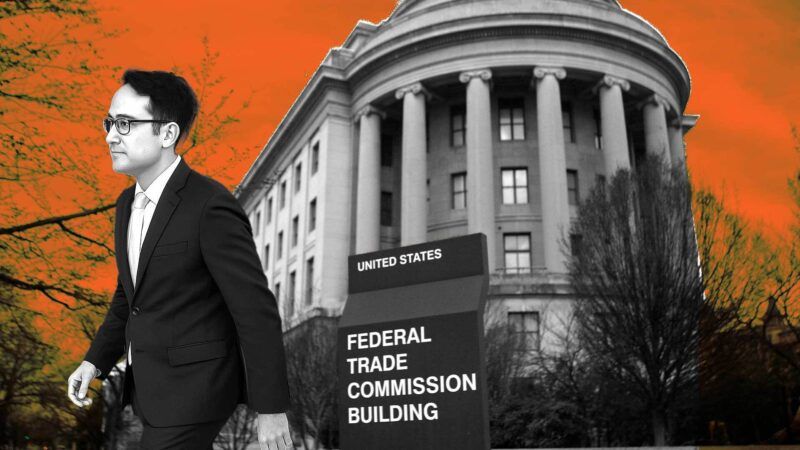Democratic FTC Commissioner Quits—But That Doesn't Mean He's Dropping His Lawsuit
Trump fired Federal Trade Commissioner Alvaro Bedoya in March. Yesterday he gave up his claim to the job, but he's still challenging the White House's right to dismiss him.

Alvaro Bedoya, former commissioner at the Federal Trade Commission (FTC), formally resigned on Monday after he and Rebecca Kelly Slaughter, the other Democrat-appointed commissioner, were fired by President Donald Trump in March. Bedoya and Slaughter have challenged the president in court, with Slaughter arguing that the firings violated "the plain language of a statute and clear Supreme Court precedent." Although Bedoya and Slaughter will continue pursuing their legal challenge to the firings, Bedoya's pressured resignation represents a major blow to the security of independent agency executives.
The Supreme Court precedent invoked by Bedoya and Slaughter is Humphrey's Executor v. U.S. (1935), which was prompted by then-President Franklin Delano Roosevelt's attempted firing of FTC Commissioner William E. Humphrey, who former President Herbert Hoover had appointed to serve a second, seven-year term on the commission in 1931. The Court unanimously ruled against Roosevelt, finding that the president is not free to fire officers of those "quasi legislative or quasi judicial agencies" created by Congress without cause. The president's ability to fire such officers at will "threatens the independence of a commission…as an agency of the legislative and judicial departments," thereby undermining the separation of powers codified in the Constitution. (The existence of executive agencies that simultaneously wield legislative and judicial powers is itself a blatant violation of this principle.)
On Monday, Bedoya filed a supplemental declaration to the U.S. District Court for the District of Columbia (the court hearing his and Slaughter's case against the Trump administration) providing his reasons for formally resigning. Bedoya explained that he has been denied his wages as FTC commissioner following his firing and that, to comply with rules and regulations, he has not accepted other employment opportunities. Since Bedoya can "no longer afford to go without any source of income for [his] family," he resigned "out of an abundance" to pursue paid employment outside the agency.
Former FTC Chair Lina Khan credited Bedoya with reviving the Robinson-Patman Act, which outlaws price discrimination, and thanked him for "his remarkable tenure" as an FTC commissioner and "his outstanding public service." She described Bedoya's resignation as "a huge loss." FTC Chairman Andrew Ferguson and Commissioner Melissa Holyoak—both of whom are named as defendants in Bedoya and Slaughter's lawsuit—have not yet spoken publicly about Bedoya's resignation, nor has the more recently appointed commissioner, Mark Meador.
The partisan divisions between FTC commissioners belie claims of the very independence that the Supreme Court regarded as "essential [so] that the commission should not be open to the suspicion of partisan direction" in Humphrey's Executor. Regardless of the partisanship of the FTC and the constitutionality of Humphrey's Executor, the now-resigned commissioner is "still suing the President! Not dropping out of the lawsuit," Bedoya emphasized on X.


Show Comments (20)